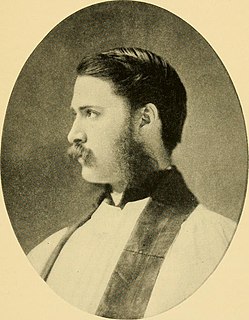
Henry Yates Satterlee was the first Episcopal Bishop of Washington, serving from 1896 to 1908. He established the Cathedral Church of Saint Peter and Saint Paul, popularly known as Washington National Cathedral.

The African Methodist Episcopal Zion Church, or the AME Zion Church (AMEZ) is a historically African-American Christian denomination based in the United States. It was officially formed in 1821 in New York City, but operated for a number of years before then. The African Methodist Episcopal Zion Church adheres to Wesleyan-Arminian theology.
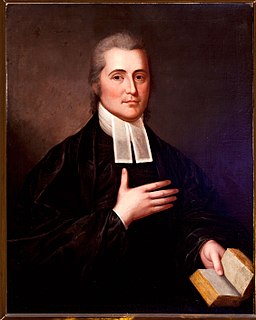
Philip Milledoler was a minister and the fifth President of Rutgers College serving from 1825 until 1840.

Sister, Sister is a 1982 American drama television movie written by Maya Angelou and starring Diahann Carroll, Rosalind Cash, and Irene Cara. The film tells the story of three sisters who come together to decide the fate of their family home after the death of their revered father. Originally filmed in February 1979, the film was shelved for three years before debuting on June 7, 1982 on NBC.

Joseph Jon Bruno was the sixth Episcopal Bishop of Episcopal Diocese of Los Angeles. He died on April 23, 2021, of natural causes.

The Episcopal Diocese of Pennsylvania is a diocese of the Episcopal Church in the United States of America encompassing the counties of Philadelphia, Montgomery, Bucks, Chester and Delaware in the state of Pennsylvania.

Daniel Alexander Payne was an American bishop, educator, college administrator and author. A major shaper of the African Methodist Episcopal Church (A.M.E.), Payne stressed education and preparation of ministers and introduced more order in the church, becoming its sixth bishop and serving for more than four decades (1852–1893) as well as becoming one of the founders of Wilberforce University in Ohio in 1856. In 1863 the AME Church bought the college and chose Payne to lead it; he became the first African-American president of a college in the United States and served in that position until 1877.

John Wesley Edward Bowen was born into American slavery and became a Methodist clergyman, denominational official, college and university educator and one of the first African Americans to earn a Ph.D. degree in the United States. He is credited as the first African American to receive the Ph.D. degree from Boston University, which was granted in 1887.

James Kemp was the second bishop of the Diocese of Maryland, USA from 1816 to 1827.
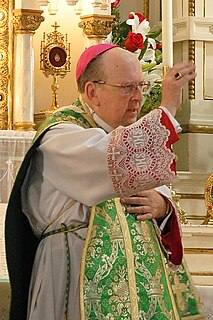
Francis Ronald Reiss is an American prelate of the Roman Catholic Church. He served as an auxiliary bishop of the Archdiocese of Detroit from 2003 to 2015.
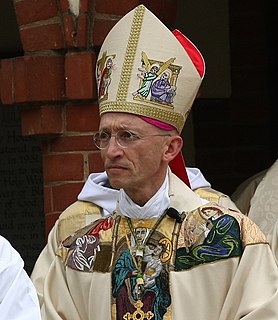
Martin Clive Warner is an Anglican bishop in England. He is currently the Bishop of Chichester.
The American Negro Academy (ANA), founded in Washington, DC in 1897, was the first organization in the United States to support African-American academic scholarship. It operated until 1928, and encouraged African Americans to undertake classical academic studies and liberal arts.

Henry Beard Delany was the first Black person elected Bishop Suffragan of the Episcopal Church in the United States. The Episcopal Church honors him, along with fellow African American bishop Edward Thomas Demby, who died on the same day in 1957, with a feast day on the liturgical calendar on the anniversary of their deaths, April 14.

George Freeman Bragg was an African-American priest, journalist, social activist and historian. The twelfth African American ordained as a priest in the Episcopal Church of the United States, he worked against racial discrimination and for interracial harmony, both within and outside of his church.
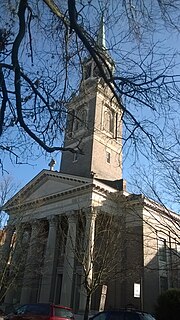
St. James's Episcopal Church is the third oldest Episcopal congregation in Richmond, Virginia. Only the older St. John's Episcopal Church on Church Hill also remains an active congregation.
John Albert Williams was a minister, journalist, and political activist in Omaha, Nebraska. He was born to an escaped slave and spoke from the pulpit and the newspapers on issues of civil rights, equality, and racial harmony. He was a highly respected minister, journalist, and civic leader. He serve on many committees and boards among Omaha's black community and in the Omaha and Nebraska Episcopal Church.
Robert Wellington Bagnall (1883-1943) was born in Norfolk, Virginia in 1883. He was a minister for the St. Matthew's Episcopal Church in 1911 and continued various careers connected to church leadership. He is most known for his civil rights activism during the 1920s. He worked for the NAACP in several positions for over 20 years.
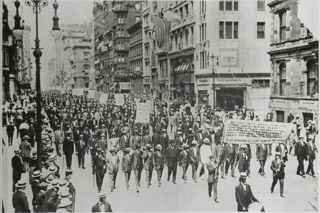
The Reverend Dr. Hutchens Chew (H.C.) Bishop was an Episcopal priest who spent most of his career in New York City. He was rector of St. Philip's Episcopal Church in Harlem for 47 years. The church is the oldest black Episcopal parish in New York. The church was founded by abolitionists who laid the first stone in 1819.
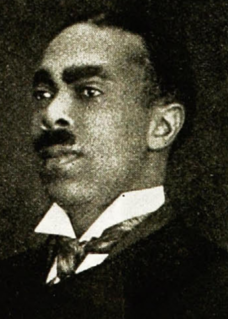
The Reverend Frederick Asbury (F.A.) Cullen was an Methodist minister, community and civil rights activist based in Harlem, New York City. He supported legal and social protests, and was influential in working with the youth of his community.
















